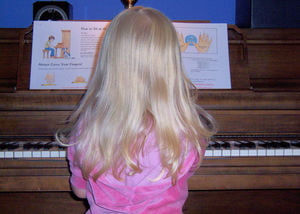As a Professional Piano Teacher, parents often ask me what age is the best age to begin piano lessons. Since all children have different skills and abilities, the perfect age to begin private piano lessons depends on the individual child.
There are three categories to consider when determining if your child is ready for piano lessons: academic skills, emotional maturity, and natural musical abilities.
What many parents don’t understand is how complicated reading music can be. Piano students not only need to know the alphabet from A to G, but they also need to know those seven letters in reverse – G, F, E, D, C, B, A.
For example, the song “Mary Had a Little Lamb” begins with the notes E, D, C. In order for a student to play that song, they must know the alphabet in reverse order from E to C. If your child hasn’t mastered the alphabet forwards, doing the alphabet in reverse can be very confusing.
Addition and subtraction are important skills used in music. Music is divided into small sections called measures. Each measure has the same number of beats. Students must first memorize the number of beats each type of note gets (a quarter note is worth one beat, a dotted half note is worth three beats.) Then the student needs to make sure each measure has the correct number of beats by adding the different note values together. If your child cannot do simple math such as 1 + 3 = 4, or 4 – 2 = 2, then they may have difficulty when it comes to counting.
Most piano teachers will have the child’s assignment written down in an assignment book. If your child cannot read, it will be your responsibility to sit with the child during their daily practice sessions. It is important to make sure your child is following all of the instructions correctly. If you are not willing, or able, to devote that much time for piano lessons, you should wait until your child is old enough to read the assignment notes and practice on their own.
Emotional maturity is necessary because studying an instrument takes a lot of patience, concentration and repetition. If your child has a short attention span, is unwilling to accept constructive criticism, gets easily frustrated or bored, or is unable to behave during the half hour lesson, then they aren’t ready for private piano lessons.
Some children will have natural musical abilities that become apparent early in their lives. You will find these children will dance and clap when they hear music. They will sing songs using the correct pitches. They will naturally be drawn to instruments and attempt to create music that is pleasing to the ear. Typically these children will have a much easier time learning how to play the piano. They would probably benefit from starting piano lessons at a younger age of five to six years old.
I have found that the average child is ready to begin private piano lessons at age seven or eight years old. The Music Teachers National Association (MTNA) website gives this recommendation, “Formal music lessons can begin when students are officially starting formal school, usually first grade.
Some piano teachers specialize in younger ages. They will have special training and methods for teaching younger children which use finger numbers instead of letters. They typically spend much of the lesson time away from the piano playing games and doing floor activities. When choosing a piano teacher, be sure to ask what age the teacher specializes in.
If money is an issue, consider the fact that most eight-year-old students learn in two months what a five or six-year-old learns in two years. Starting your child at an older age can definitely save you a lot of money in lesson fees and materials.
Even if your child isn’t ready for formal piano lessons, there are other musical opportunities available for your child. Many Community Education programs offer group music appreciation classes. The Music Teachers National Association recommends that 5-6 year olds enroll in programs that “introduce your child to the instrument, but also involve movement, rhythm activities, singing and more.”
Reference:
- The Music Teachers National Association www.mtna.org
